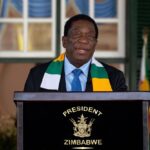Johannesburg: The Economic Freedom Fighters (EFF) is facing a major crisis as key figures continue to resign, raising serious questions about the party’s future and the leadership of Julius Malema.
Following the resignation of former deputy president Floyd Shivambu last week, the party has lost another prominent member, Sizwe Nkosi, the deputy branch secretary for the Chief Albert Luthuli sub-region of Mpumalanga.
Nkosi, in a letter addressed to EFF ward chairperson Sbongile Mbatha, stated that he is voluntarily joining uMkhonto WeSizwe (MK), the armed wing of the African National Congress (ANC), and will continue to uphold a militant and radical stance in his political endeavours.
“I appreciate the opportunities I have had to serve and work alongside you all,” he wrote.
Shivambu’s resignation, which came after a reported fallout with Malema, has left the EFF crippled and vulnerable. Sources within the party have revealed that Shivambu was approached by wealthy businesspeople who allegedly promised him significant funding to challenge Malema’s leadership at the party’s elective congress in December. Malema, upon learning of this, reportedly reacted harshly, leading to a bitter rift between the two former allies.
Shivambu, in his resignation letter, emphasized that his decision was not a vote of no confidence in the EFF but a revolutionary act that would allow progressive forces to unite and work towards a shared agenda. He stated that he would continue to fight for economic liberation and genuine freedom.
The departure of Shivambu and other prominent figures has fuelled speculation about further resignations within the EFF. Dr Mbuyiseni Ndlozi, Vuyani Pambo, and Carl Niehaus are among those rumoured to be considering leaving the party. Veronica Mente, the party’s national chairperson and a close ally of Shivambu, is also reportedly on her way out.
Malema, in his characteristically fiery style, has vowed that the EFF will overcome this challenge, stating that the party will have to pass this test or die. He has also expressed his belief that the EFF will remain a formidable force in South African politics despite the loss of key figures.
However, the EFF’s ability to navigate this turbulent period remains uncertain. The party, built around Malema’s personality, may struggle to adapt to the loss of Shivambu, who was considered a strong ally and a key figure in the party’s leadership structure.
The departure of these prominent figures could also fracture the “progressive caucus” in parliament, potentially weakening the opposition to the ANC and DA.
The formation of an alliance between the MK party and the EFF, which both share a similar ideological base, has also been met with skepticism.
The two parties are now competing for the same support base, and their ability to find common ground and differentiate themselves remains to be seen.
EFF’s support dropped in the May 2024 elections, falling from 11.36% in 2019 to 9.77%, leading to its demotion from the third to the fourth largest party in South Africa. The emergence of the uMkhonto weSizwe (MK) Party, which has quickly gained traction, has added to the EFF’s woes.












